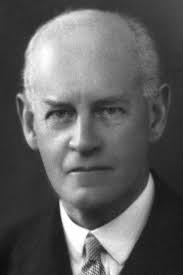Reappraisal Reading Circle is an open meeting discussing the works of a prolific, popular author of the past whose works are held in quantity by the Athenaeum. Participants are encouraged to read any work by the selected author to contribute to the discussion. Even if you haven’t read any of the books you are welcome to attend. Meetings are usually held on the 3rd Monday every other month but occasionally are held on Fridays in the event of a Monday holiday.
John Galsworthy (1867-1933)
John Galsworthy won the Nobel Prize for Literature in 1932. Today if Americans know  him at all, it is because of the TV adaptations of his Forsyte Saga. This is his best work, a celebrated set of three trilogies, nine novels in all. Although Galsworthy was a highly regarded writer in his lifetime, and his literary output was immense and popular, his renown did not survive him and he has never become part of the literary canon.
him at all, it is because of the TV adaptations of his Forsyte Saga. This is his best work, a celebrated set of three trilogies, nine novels in all. Although Galsworthy was a highly regarded writer in his lifetime, and his literary output was immense and popular, his renown did not survive him and he has never become part of the literary canon.
Galsworthy was trained as a lawyer. Sensitized to injustice, he became an advocate for greater social justice — especially for women, and with regard to prison reform. He used satire to admonish the British system of social class. He used plots with social scandal to test society and criticize its solutions. But Galsworthy was not truly a campaigner or reformer or rebel. Edward Wagenknecht in The Cavalcade of the British Novel, writes (page 486): “Galsworthy might possibly have been more strongly tempted to use his art for propaganda purposes had he possessed a more hopeful nature. Wells and Shaw are great crusaders because they are great believers in human perfectibility. Galsworthy had no such faith. For him the roots of human maladjustment lay deep in the stuff of human nature itself. Palliation might be possible, but there could never be a cure. . . He believed that life is a mess, and that we should be kind.” Galsworthy is sympathetic even to his unlikeable characters. He believed that both kindness and art are able to break down barriers between people. His voice was that of a passionate and compassionate humanist.
Perhaps it is time to rediscover John Galsworthy. Come to the Athenaeum and share your reading about this author on Monday, March 18 at 7 pm.
An excerpt from Galsworthy’s story, The Lost Dog:
“Master, I know it is a thin and dirty cur, but the creature follows me.”
“Keep to heel! The poor dog will get lost if you entice him far from home.”
“Oh, Master! That’s just what’s so amusing. He hasn’t any.”
And like a little ghost the white dog crept along behind. We looked to read his collar; it was gone. We took him home–and how he ate, and how he drank! But my spaniel said to me:
“Master, what is the use of bringing in a dog like this? Can’t you see what he is like? He has eaten all my meat, drunk my bowl dry, and he is now sleeping in my bed.”
I said to him, ”My dear, you ought to like to give this up to this poor dog.”
And he said to me: “Master, I don’t! He is no good, this dog; I am cleaner and fatter than he. And don’t you know there’s a place on the other side of the water for all this class of dog? When are we going to take him there?”
And I said to him: “My dear, don’t ask me; I don’t know.”